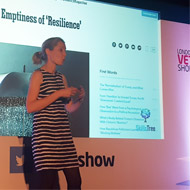Resilience: Are we over-responding?

Veterinary surgeon Jenny Moffett stressed that we should not be backing away from mental health.
Mental health has been the subject of increasing attention in recent years - among the veterinary profession and society in general. But are we over-responding to the problem? This was the concern raised by Professor Kathryn Ecclestone at BVA Congress yesterday (17 November).
There has been a massive shift in the cultural discourse of young people over the past 30 years, something that has been termed a 'vulnerability zeitgeist'. Prof Ecclestone, who is professor of education at the University of Sheffield, said she is troubled by the "apocalyptic" and "alarmist" language being used in the media and elsewhere.
A massive increase is being seen in demand for support services and Prof Ecclestone believes the lines are starting to blur between those with serious mental illnesses that require intervention, and those with everyday problems. She raised concerns that this situation could be diverting resources away from those who really need it.
There is a fine line between doing too much, and not doing enough, she added. So how do we get the balance right? This is a debate Prof Ecclestone says we need to be having.
Veterinary surgeon Jenny Moffett stressed that we should not be backing away from mental health. "I don't want the take-home message from this to be let's step back from resilience, because that would be a step in the wrong direction."
Resilience should not be the responsibility of the individual, she explained. If the environment is not conducive, then it is not possible to practise resilience.
It is known that in the veterinary profession there are high rates of depression, anxiety, stress and burnout, as well as psychological and mental distress. There is also an elevated rate of suicide. Yet it is only relatively recently that the profession began talking about it. Moffett strongly warned against taking a step backwards in this respect.
There is also a need to debunk the idea that we must lose knowledge from the veterinary course in order to add teaching on mindfulness. Moffett used an example from the University of Surrey, where it was calculated there were 2,390 hours of veterinary content and 10 for mindfulness.
In order to be successful, such interventions must be made relevant to the job and based on evidence, she added. The impact they will have on students should also be considered and outcomes measured. It is important to highlight the positives, as well as the potential stresses, of working in practice.
In the wider profession, Moffett said we should be open about failure - it is inevitable that things will go wrong and this should be part of the discussion. The idea of increasing consultation times was also floated, although this would require research on the possible impacts to practices.
Whilst the debate highlighted the complexity of dealing with resilience in the profession, it underlined the importance of ensuring interventions are fit-for-purpose and able to reach those who most need them.



 The latest
The latest